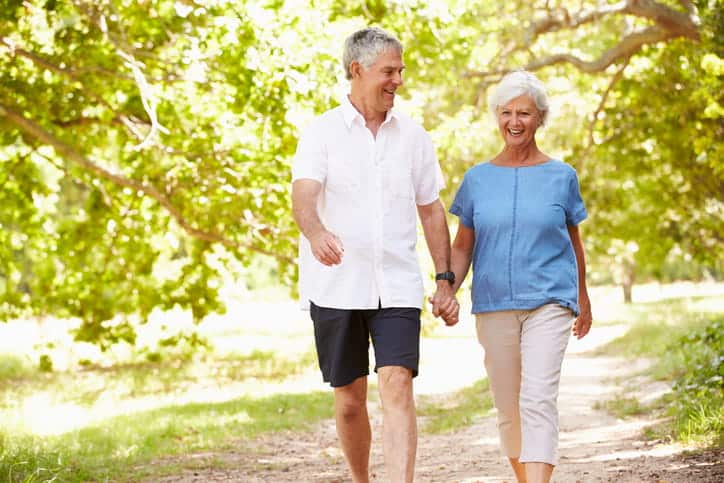Summer heat waves can be miserable for anyone, but they can be downright dangerous for seniors. According to Harvard Medicine Magazine, as many as 12,000 people die in the U.S. annually from heat-related illnesses, and roughly 80% of these people are over the age of 60. Keep reading to learn more and find summer safety tips for seniors.

What Are the Main Risks of Heat Exposure for Seniors During the Summer?
According to the National Institute on Aging (NIH), people 65 or older are at a higher risk for heat-related illnesses such as heat syncope, heat rash, heat cramps, heat edema, heat exhaustion, and heat stroke. All of these are risky for seniors’ health, and heat stroke can even be fatal.
Why Are Seniors More at Risk?
The NIH notes that seniors are more at risk of heat-related illnesses and even death due to several factors. Not only do older adults have a more difficult time adjusting to sudden and drastic temperature changes, but they are also more likely to have risk factors that can make heat-related illness more likely to occur, such as:
- Issues with kidneys, lungs, or cardiovascular health
- Illnesses resulting in weakness or fever
- Prescription drugs that may cause the body’s cooling mechanism to not function properly
- Interactions with certain prescription drugs
- Skin changes caused by aging
- Inadequate water intake
- Living somewhere without air conditioning
- Being overweight or obese
- Drinking alcohol or caffeine
What Are the Signs of Heat Exhaustion or Heat Stroke that Seniors Should Watch Out For?
According to the NIH, heat exhaustion can lead to heat stroke when not treated. The signs of heat exhaustion are:
- Thirst
- Weakness
- Unsteadiness
- Dizziness
- Queasiness
- Cold and clammy skin
According to the NIH, a heat stroke is an emergency condition when a person’s body temperature rises to 104 degrees. Heat stroke can lead to death in severe cases. The warning signs of heat stroke are:
- Confusion
- A lack of sweating despite the temperature
- Skin that is flushed
- A change in pulse (fast and strong or sluggish and weak)
Senior Safety Tips for Summer
Elderly summer safety is crucial to avoid heat-related illnesses. The Centers for Disease Control and Prevention (CDC) recommends the following summer heat safety tips for seniors:
- Wear lightweight, light-colored, and breathable fabrics
- Stay in air-conditioned places as much as possible
- Avoid strenuous activities on hot days
- Limit time outdoors
- Wear sunblock (SPF 15 or higher) and reapply regularly when outdoors
- Stay in a cool place (ideally air-conditioned)
- Drink plenty of fluid (ideally water)
- Take a cool bath or shower to cool off when it’s hot
- Get plenty of rest
FAQ
How Can Seniors Stay Hydrated in Hot Weather?
According to the NIH, the best way for seniors to stay hydrated is by drinking plenty of water and avoiding caffeine and alcohol. 100% fruit or vegetable juices are also a great source of hydration. Carrying a reusable water bottle and sipping it continuously throughout the day is likely the best way to stay hydrated.
Note: If you’re on diuretics and struggling to maintain hydration, talk to your doctor about a hydration strategy that works with your medication(s).
How Can Seniors Keep Their Homes Cool in Hot Weather?
- Avoid using the stove or oven
- Avoid using appliances that emit heat (including the washer and dryer) during the hotter parts of the day
- Keep the air conditioner (AC) running, or go somewhere with AC if you don’t have one
What Should Seniors Do if They Do Not Have Access to Air Conditioning?
- Keep windows and curtains closed during the day
- Open windows at night
- Spend afternoons somewhere with air conditioning, such as a friend or relative’s home, the mall, a theater, or at your local senior center
- Use fans to create a cross breeze, but don’t rely on fans when it’s at or above 90 degrees inside the house (this may make the heat worse), according to the CDC
- Consider staying in an assisted living facility during the summer months to stay cool and safe and ensure any medical conditions don’t worsen during this difficult time of year
How Can Seniors Safely Exercise or Stay Active in the Heat?
Low-impact exercise in the cooler parts of the day is ideal to avoid overheating. You can also break up exercise into shorter periods throughout the cooler parts of the day to stay cooler. If you can, you could join an age-appropriate water aerobics class in your area or a low-impact exercise class in an air-conditioned building.
Navigating the summer heat is crucial for seniors. Following these tips can assist you in avoiding heat-related illness. If you or your loved one lacks air conditioning, locate your local cooling shelters before any heat waves. You can also check out the services offered at Haven Health’s skilled nursing facilities so your loved one can access our skilled nursing services and be safe from the heat.
Are you looking for senior care facilities near you? Contact Haven Health to learn more about the services offered at our nursing facilities.
Sources:
About Heat and Your Health. (2024).
Heat and Older Adults (Aged 65+). (2024).
Hot Weather Safety for Older Adults. (2022).
The Effects of Heat on Older Adults. (2021).